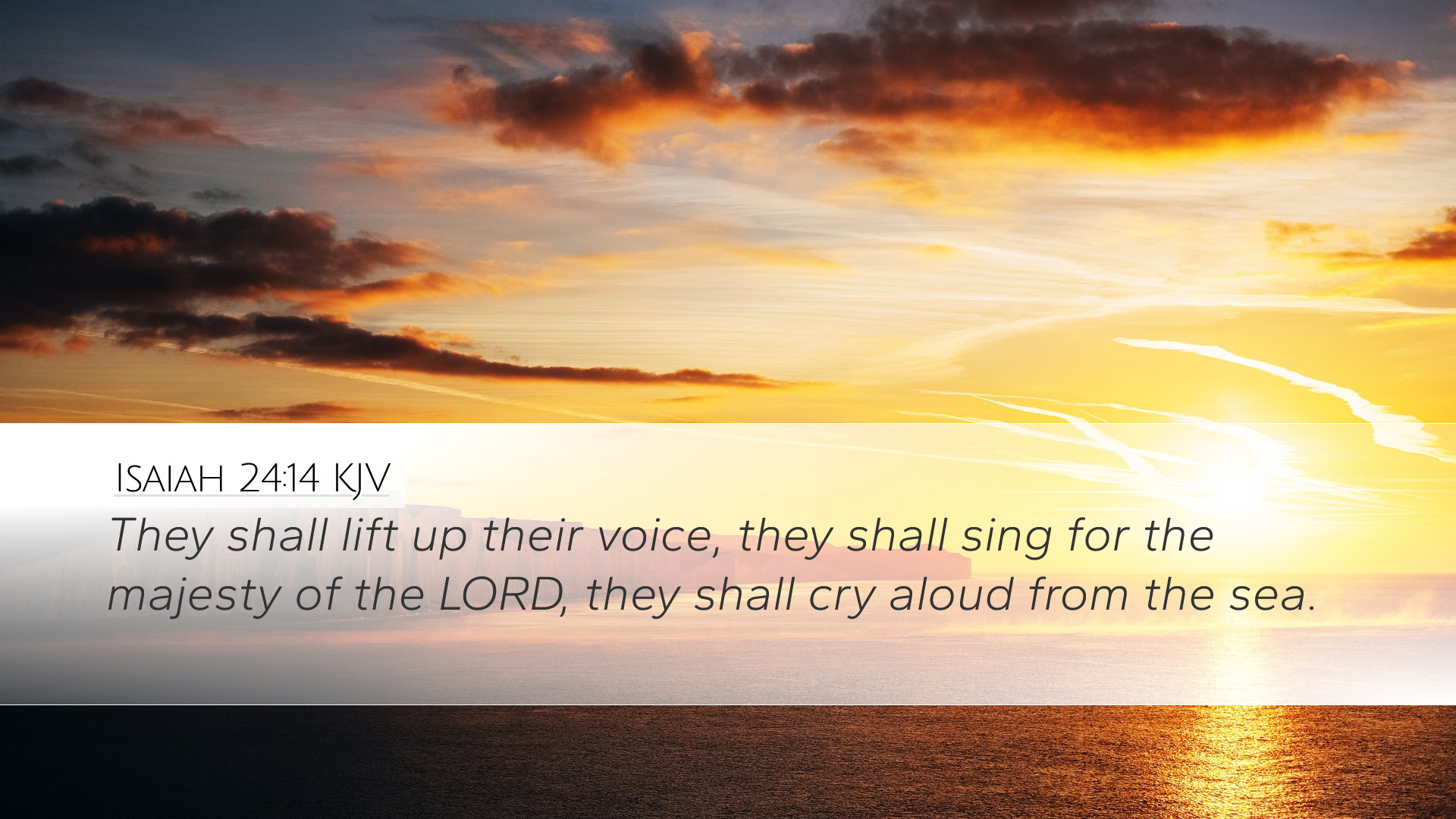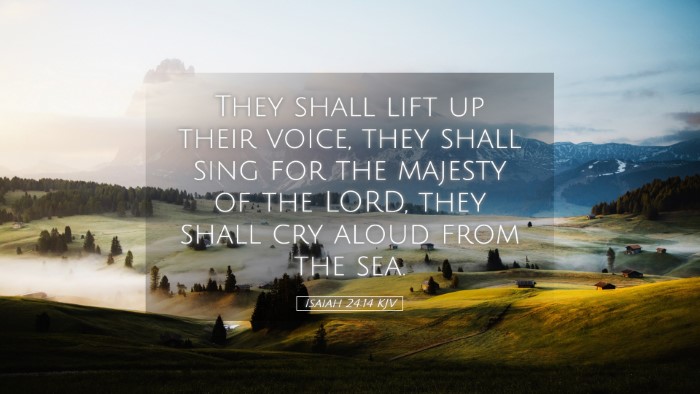Commentary on Isaiah 24:14
Text of Isaiah 24:14: "They lift up their voice, they sing for the majesty of the Lord; they shout from the sea."
Overview
Isaiah 24 presents a prophetic vision of judgment and the subsequent restoration of creation. This chapter contrasts the calamity that befalls the earth with the exuberant praise from those who recognize the Lord's sovereignty. Verse 14 serves as a poignant expression of that praise during times of turmoil.
Contextual Analysis
The surrounding chapters detail God's judgment upon the earth due to its corruption and sinfulness. Isaiah speaks to a universal catastrophe—a world turned upside down. Yet in the midst of this chaos, there emerges a remnant that still honors God. They respond not with despair but with song, highlighting the duality of despair and hope within the prophetic message.
Exegesis and Language Study
- The significance of "lift up their voice": This phrasing indicates a collective response from the people. It implies that they are not only singing individually but are engaging in a communal act of worship and acknowledgment of God’s greatness.
- Interpretation of "sing for the majesty of the Lord": The term "majesty" refers to God's sovereignty and greatness. The people’s song emphasizes that even amid judgment, God’s character remains majestic and worthy of praise.
- "Shout from the sea": The sea often symbolizes chaos in biblical literature. Their shouts from the sea signify triumph over chaos—an expression of faith that echoes from the very depths of turmoil.
Matthew Henry's Commentary Insights
Matthew Henry emphasizes the joyous proclamation and the contrast between the judgment on the earth and the uplifted voices of praise. He notes that this verse serves as a reminder to believers that worship can arise even from the bleakest circumstances. God's justice and mercy coexist, prompting the faithful to declare His glory amidst desolation.
Albert Barnes' Commentary Insights
Albert Barnes focuses on the aspect of the "shout" and its implications for global worship. He observes that while divine judgment is severe, it leads to a renewed understanding of God’s power and glory. Barnes points out that this reflects the ultimate purpose of God’s wrath, which is to lead people to glorify Him even in judgment. The image of shouting from the sea indicates a universal recognition of God's sovereignty.
Adam Clarke's Commentary Insights
Adam Clarke elaborates on the collective nature of the praise articulated in this verse. He offers an interpretation that underscores the prophetic nature of the singing—suggestive of future restoration and hope. Clarke highlights that believers are called not only to endure but to proclaim God’s praise, which serves to uplift both the individual and the community during times of distress.
Theological Implications
This verse encapsulates the Christian call to worship consistently, even amid troubling times. The act of sinners recognizing God’s majesty and joining together in worship reflects a foundational aspect of faith—that through adversity, believers are called to lift their voices in testimony to God’s greatness.
The praises lifted "from the sea" metaphorically suggest that God's glory is proclaimed even from places associated with turmoil and strife. It reinforces the belief that God's presence is universal and that no realm on earth, not even the tumultuous depths of the seas, is outside His sovereign reign.
Practical Applications
- Encouragement in Trials: This passage serves as an encouragement for individuals facing trials to continue praising God, reminding them of His majesty and sovereignty.
- Collective Worship: It stresses the importance of communal worship, urging congregations to come together in thanksgiving and adoration, especially in moments of crisis.
- Faith’s Response to Judgment: Pastors and leaders can use this verse to teach about the righteous response to God’s judgments—an invitation to glorify God even during times of correction.
Conclusion
Isaiah 24:14 encourages believers to proclaim their faith audibly and boldly amidst challenges. The combined insights from the commentaries of Matthew Henry, Albert Barnes, and Adam Clarke deepen our understanding of this profound verse, illustrating that worship transcends circumstances. The Lord’s majesty demands acknowledgment, and thus, whether in times of joy or turmoil, our voices should rise in unison declaring His greatness.


